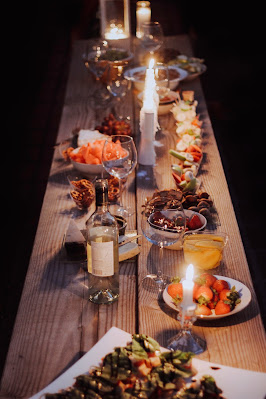At the Table
In a recent post (here) I talked about the power of habits and how they form us as individuals and communities. Well that got me thinking about the habits we’ve grown as a family over the past 27 years of marriage. One enduring habit has to do with food and mealtime. Both my parents are great cooks and dinners were always something to look forward to growing up. Thanks to them, I also love preparing and eating food. My friend from work Karen and I regularly text each other prideful photos of our latest culinary creations (though she always wins hands down). There is something delightful, glorious, spiritual even about the gift of good food.
In our home, we always eat at the table, we wait till everyone has arrived, we hold hands around the table as one of us thanks God for meal, we eat (it’s always chaotic, noisy and messy with three kids under 17), and when everyone is done we take turns to clean up (usually with some measure of stalling or complaining). Oh, and no screens are allowed, ever.
I you are gen X or older this may not be such a foreign idea but if you are younger, that might sound like a totally weird set of habits, especially given that Australians are increasingly likely to eat on the lounge in front of the TV. Recent Australian studies by social researcher Mark McCrindle have found that over one third of all Australians eat away from a table and in front of a screen. This figure grows to about 50% with people aged 20-40. In his analysis for Freedom Foods, Mark said “an increasing number of families were eating their meals by the television because time poor parents juggling work and domestic commitments, want that time to unwind in the evening”. He continues, “I think that whole process of preparing, cooking and sitting down to a meal together has moved from being the ever day experience to being a special experience.”
The Uber eats phenomena (which I just can’t get my head around) reflects this gradual cultural shift in western nations away from food preparation and shared consumption being central to our daily practice. We order the food on a screen then watch the screen while we eat it. It also highlights how far we’ve moved to outsourcing the basic stuff of life. Sure, we still have a plethora of cooking shows and food documentaries which inspire a particular segment of the public, but I wonder if these shows are more aspirational than anything else?
I don’t think we are going to stop loving good food anytime soon but I do wonder if we need to reclaim its significance and the power in the habits of the table as a central expression of our community with one another and I think, community with God.
The lounge may be more comfortable and the TV more entertaining but what are you missing out on, and at what cost to the people you are doing life with?
In our home, we always eat at the table, we wait till everyone has arrived, we hold hands around the table as one of us thanks God for meal, we eat (it’s always chaotic, noisy and messy with three kids under 17), and when everyone is done we take turns to clean up (usually with some measure of stalling or complaining). Oh, and no screens are allowed, ever.
I you are gen X or older this may not be such a foreign idea but if you are younger, that might sound like a totally weird set of habits, especially given that Australians are increasingly likely to eat on the lounge in front of the TV. Recent Australian studies by social researcher Mark McCrindle have found that over one third of all Australians eat away from a table and in front of a screen. This figure grows to about 50% with people aged 20-40. In his analysis for Freedom Foods, Mark said “an increasing number of families were eating their meals by the television because time poor parents juggling work and domestic commitments, want that time to unwind in the evening”. He continues, “I think that whole process of preparing, cooking and sitting down to a meal together has moved from being the ever day experience to being a special experience.”
The Uber eats phenomena (which I just can’t get my head around) reflects this gradual cultural shift in western nations away from food preparation and shared consumption being central to our daily practice. We order the food on a screen then watch the screen while we eat it. It also highlights how far we’ve moved to outsourcing the basic stuff of life. Sure, we still have a plethora of cooking shows and food documentaries which inspire a particular segment of the public, but I wonder if these shows are more aspirational than anything else?
I don’t think we are going to stop loving good food anytime soon but I do wonder if we need to reclaim its significance and the power in the habits of the table as a central expression of our community with one another and I think, community with God.
The lounge may be more comfortable and the TV more entertaining but what are you missing out on, and at what cost to the people you are doing life with?
(Side note here: This lounge/table contrast is a good analogy of the church too. Do we want 'be fed' as we sit shoulder to shoulder staring at the platform in a mostly anonymous setting, or do we want to eat together, face to face, interacting, sharing with each other?)
I think Jesus knew this too. Jesus seemed to have a thing about food and parties such that he was accused of being a drunkard and glutton (Luke 7.34). Throughout the gospels Jesus is either going to a party, at a party, or having just left a party. And, it was in these contexts, up close with others around a shared meal, that we see some of the most beautiful life changing moments in His ministry. The night before his death Jesus plans a meaning-laden feast to be shared with his closest friends, a meal they would later establish as a centre point of their identity and solidarity. And soon after His resurrection, Jesus shares a breakfast on the beach with Peter, again a meal that changed the course of his life.
Food and feasting is a surprisingly constant theme running through the biblical narrative, from Genesis to Revelation. The first words of God to humans are an invitation to eat and the final vision of the new world is of a massive, joyful banquet. This is no coincidence. There is something deeply spiritual and significant about the table in our humanity.
The table can be a place of the simple human rhythm of eating in shared community.
The table can be a place of learning how to communicate and navigate relationships and mess.
The table can be a place of grace and invitation and inclusion for the lonely.
The table can be a place of continuity and intentionality for scattered, time poor people.
The table can be a place of remembering, a place of restoration and redemption.
May you and those you love skip the lounge, set aside the devices, and rediscover the gift that is the table in your home. And, may that table always have a spare seat for others to join you.













